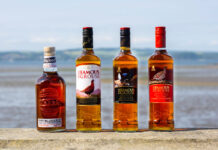A year spent mixing their own drinks has raised the bar for many cocktail drinkers

WITH trade having been disrupted – or cancelled entirely – for much of the past year, Scotland’s pub, bar and restaurant operators will be hoping to make up for lost time during the remainder of 2021.
While drinks such as draught beer and simple spirit mixer serves continue to be essential for operators, cocktails have become a force to be reckoned with in a lot of venues over the past few years.
And the past 18 months of lockdowns and restrictions have only served to sharpen interest in mixed drinks, according to brand owners and distributors, who reckon expectations this autumn could be higher than ever.
“With 22% of consumers drinking cocktails at home during lockdown, cocktails present a great opportunity for bars and pubs as consumers return to the on-trade,” said a spokeswoman for Campari Group UK.
“According to CGA’s COVID recovery study, 80% of consumers want just as much value for money as they did pre-lockdown.
“Within that, ‘good quality’ and ‘worth the cost’ were called out amongst the top five factors denoting value for money.
“This creates the opportunity to position cocktails as a strong value option, delivering high quality serves that are worth the spend.”
Indy Anand, director at rum importer Skylark Spirits, reckoned many cocktail fans spent the past year “learning the classic cocktails and replicating them to a high standard”.
“As a result, they will expect cocktails at venues to be superior to their own creations or for venues to dive into new creative areas, which autumn is a perfect time for,” he said.
“With new flavour combinations now in season, venues can experiment with quality ingredients to produce some truly special serves and really wow their consumers.”
And this pressure won’t just apply to city centre cocktail bars, argued Alex Carlton, chief executive of Elegantly Spirited, the company behind alcohol-free spirit brand Strykk.
Carlton said that, with a section of the population continuing to work from home, neighbourhood bars and pubs will also be expected to provide quality cocktails to their customers.
“Local neighbourhood bars and pubs will thrive and see incremental growth to their business requiring them to look at their cocktail offering more seriously,” he said.
“Cocktails can no longer be an after-thought but must be an integral part of the menu to attract customers, compete and survive.”
The changing of the seasons has traditionally signalled a change in cocktail menus, as tastes turn to darker spirits and richer flavours; and Teddy Joseph, whisky specialist at Edrington UK, said he expects that to be the case again in 2021 as “seasonal fruits such as plums, figs, rhubarb, apples and pears return to prominence”.
“Bartenders will use these fruits to add richness and depth of flavour to serves as consumers seek more warming cocktails,” said Joseph.
“The use of ginger will also become an easy way of adding additional spice to serves, complementing the flavours typically found in whiskies, rums and bourbons.”
Carlton, at Elegantly Spirited, summed up the shift by saying he expects lighter serves to be “replaced by celebratory, indulgent ‘birthday’ cocktails in the run up to Christmas”.
And “timeless” spiced flavours such as nutmeg, star anise and cinnamon are likely to be in favour as customers look for more warming flavours, reckoned Clayton Thomson, premium brands manager at C&C Group.
He also steered licensees towards hot serves such as “spiked teas” as “a great and easy to make option”.
And the lockdowns of the past year and a half will have left their mark on which styles of drink prove most popular with bartenders, reckoned Thomson.
He said: “I do have a theory that blended cocktails may make a long-term re-entrance into the high-volume market.
“Ironically, most of my personal bartender friends do not have much cocktail equipment in their houses and were therefore turning to easier mixing methods available.
“In addition to blended (cocktails), stirred-down drinks with brighter, fruitier flavours and non-perishable ingredients have emerged from the other side of the lockdowns.
“This has come from businesses experimenting with ways to sell bottled cocktails in very unpredictable climates for volume.”






















